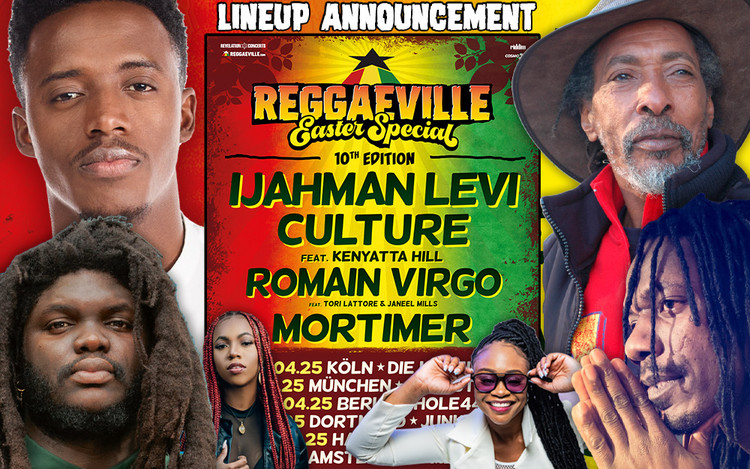Lidiop ADD
Talking to a Prince – Interview with Lidiop
09/22/2022 by Gardy Stein
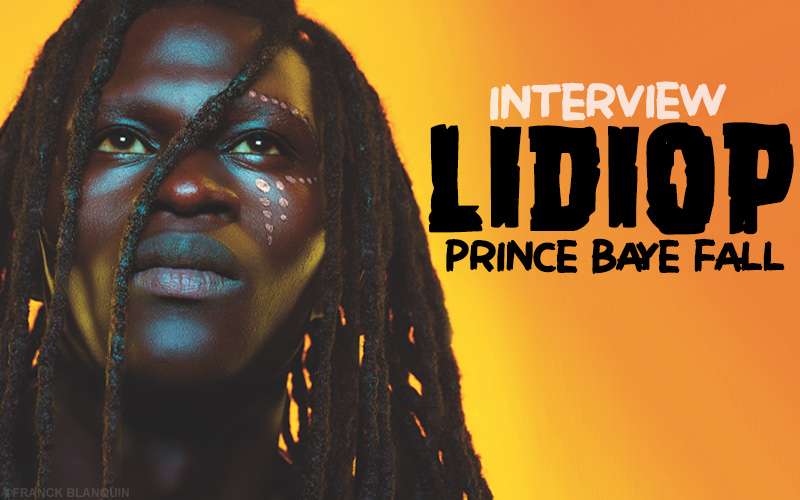
Sitting at our Reggaeville workstation at this year's Summerjam, two young men came up (Davis and David, if I remember correctly) and asked if they could talk to me for a moment. They told me about an artist called Lidiop aka Prince Baye Fall whom they had just seen at the festival, "an immensely talented singer from Senegal you have to feature in your magazine!" We arranged to meet for a jam session later that day, which turned out to be a spontaneous Soundsystem performance, and I was not the only one blown away by Lidiop's vocal skills there and then. Fast forward to today, the young artist has just released a wonderful acoustic album called Another Vision (read our album review HERE) and continues to amaze people by his heartfelt music and authentic delivery. About time we introduced him to you!
Read on to find out about his humble beginnings in Senegal, his spiritual connection to the Baye Fall, his first steps in Paris' music scene and his vision for the future:
Since people might not yet be familiar with you, can you please introduce yourself first?
Sure! I'm Lidiop, born and raised in Senegal. I started to do music in Senegal, I participated in a Reality TV Show called Super Star in 2009. Some time after that I got my license for studying Telecommunications, and I decided to come to France because my sister is living there. When I arrived there, I stopped everything else to do music. I started to play in the streets, in the subway, and from there things went far.
Was music something you grew up with in your childhood, in your family?
No, nobody in my family played music, there are no artists or musicians in my family. My mom was listening to Salsa, my dad was listening to French Variété. The person who made me discover Reggae was my big brother, who passed away. The first song Reggae I remember was Sweat by Inner Circle. I was very young, but this thing stuck in my head (sings "Alalalalalong…"). I listened to more music when I started to learn English. You know, Africa loves Bob Marley, and I was electrified when I understood his lyrics. I was eleven maybe, I started to learn English at school, and I listened to his songs and I translated them and I was like, 'Wow, how is it possible, this guy is not living here and talking about all these things?' I felt something I never felt before, so in that time I started to listen to a lot of Reggae music, my first CDs were by Bob Marley, Peter Tosh, and a lot of Lucky Dube. The one who inspired me most was a Senegalese singer called Dread Maxim, he was singing in Wolof and I listened to him and I understood everything. I realized that I wanted to play music just like that. But my father was in the army, he was very strict and serious about me going to school. I secretly bought a little guitar in a case and hid it in my room, under the bed, and I wanted to learn how to play. There was an old man living in my street in the military camp, he was a guitar player, and I went to ask him, "Can you teach me two or three chords?" Well, he did, and then one of my friends had a Bob Marley song book with all the chords inside, so I copied it on paper and practiced them, that's how I learned to play guitar. And then sometimes a melody came to my head, but I was like, 'No way!', I never thought of becoming a singer.
Did you receive any vocal training, any singing lessons?
No, never! In 2009, I decided to go to the studio to record a demo, but when I showed it to the people, they said, "Go away!" (laughs). The thing was, I would sound like Dread Maxim, people said that's not you, that's Dread Maxim. I went back to the studio and met Faada Freddy from Daara J, and when I started to sing, he asked, "Do you listen to Dread Maxim?" I said yes, and he said, "Stop listening music, find yourself." And I said to myself, 'This man is crazy, I'm coming here to pay my money to make my demo, and he tells me to find myself… how, am I not here with myself?' But he insisted, he said, "Go home, and in one month you have to come back, but stop listening music!" And after one month I understood what he was talking about. I'm so grateful about that, and I told him later "Thank you for the advice!", because this pushed me to find out who I am, to find my voices and everything I wanted to do - that's how Lidiop was born.
You talked about a contest before, how did that happen?
It was a TV show, yes. I had three songs and applied to the contest and they took me in. It was filmed in a big villa for some days, and I went until mid-finals. Then I had my first lesson in humility and simplicity... When I dropped out of the TV show, I went back home, that was on a Saturday. Now, my mum she got some sheep, and every Sunday we have to clean up and watch them. So, she woke me up at seven and said, "Get up to watch the sheep." And I said, "Mom, how come, yesterday I was on TV, everybody knows me, and now you want me to go out?" And she said, "Yes yes, you are at my home and you are going to do it." And I said, "OK, I will call my brother and tell him he will have to do it alone today." She asked, "Is this a joke? You have to do it! It's not like you were on TV and now everything will change. No! You are in my house and you are my son!" And I was going out, doing the things, and I was really angry, but later I realized, definitely she is right! Why am I changing the way I'm living because I was on TV? And then I started to live the simplicity and humility way.
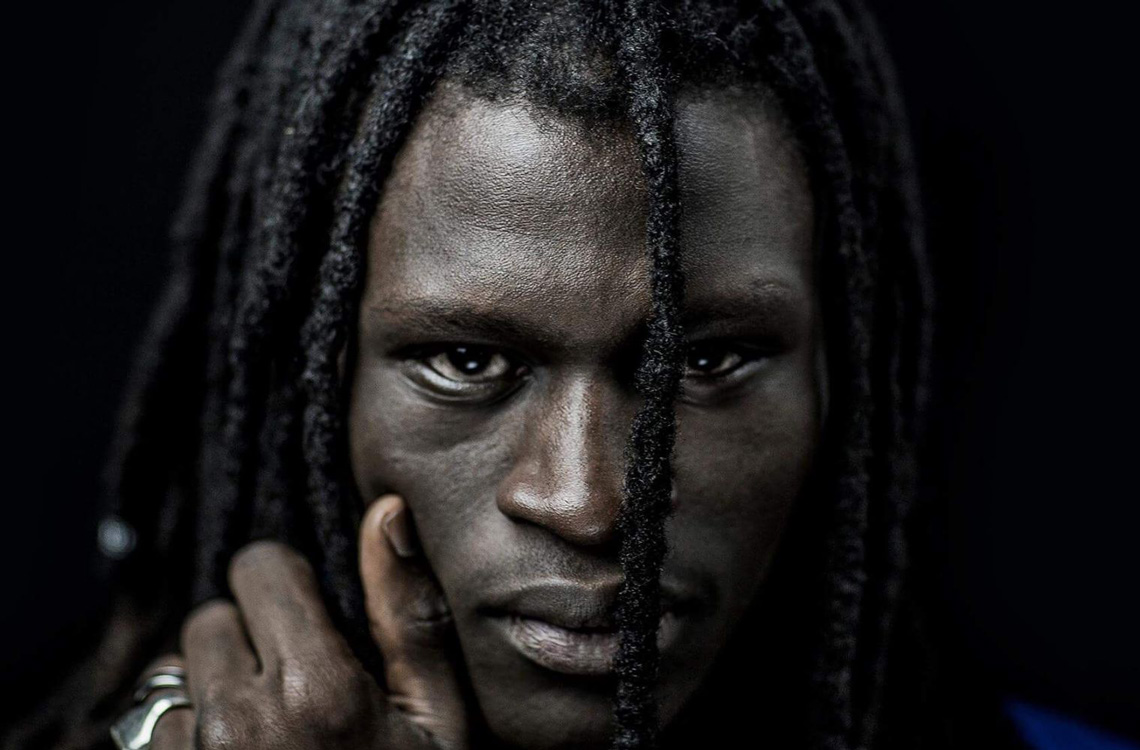
What were your first steps in music when you came to France?
I arrived in Paris on a Friday in July or August in 2012, at my sister's home. She showed me around, where the subway is and how to get tickets and so on, and told me "Do what you have to do." One of my cousins was there, too, and he called me and we met around six to have a coffee, and then the next night we went to a club where a jam session was held. I told the guy who organized it, "I'm from Senegal, I'm a musician and I want to play." And he said, "Ok, let me hear two songs." And I played the two songs and he was like "Wow, you have to come back on Sunday!" And I came back and I met other musicians there, and then I went to the little bars around my house to ask for gigs. They asked me, "Where is your demo, do you have Facebook?" and I said, "No, but I have my guitar, if you want I can play two songs!" That's how I started booking like five bars in the week, every day I'd go to a different bar, I did that many times.
That way I connected with some musicians, and I wanted to start my own band. I held a meeting and I found a guitarist who was a Rock guitarist and a drummer who was a Metal drummer and I was like, "Ok, how are we going to play Reggae?" They said they didn't know anything about Reggae. Really! (laughs) This was the first rehearsal, I taught them how to make the skank, and then a bass player came in too, that's how we started to rehearse.
Ok, that sounds crazy! You said you also played in the subway?
Yes! One night I was waiting for the subway to go back home, and I looked at the people around me. Some looked sad, some were on the phone, and I thought, 'What can I do to give them some joy?' Then I took my guitar, I said, "Hello, I will play my songs for you, I don't need money or anything, just to share these vibes!" And I played and they were smiling, and then they told me, "You know, they have musicians in the subway, you can play there too!" So, the next day I took my guitar and went to the subway to play, and then a security guard came and asked, "Where is your card?" I gave him my ID card, but he said, "No, I don't talk about this, you need a card to play music in the subway!" I told him that I didn't know that, and he said I have to go to this place to do an audition. I went there and they gave me the card, and then I started to sing in the subway. One day there was a contest for the singers in the subway, and the winner would play at a big festival called Solidays. Well, I won the contest, and that was my first big performance, in 2015, my first big festival. I played with my band, at that time I was calling them Lidiop and the Deep Roots. We made a great show and the next year they called me back. I played three times at Solidays.
Some time after that, my dream became reality. It was in 2016 or 2017, one day my phone rang and a lady asked, "Are you Lidiop?" And I said yes, and she asked me, "Do you want to play with Tiken Jah Fakoly?" I told her, "If this is a joke it's not funny! This is my dream, he inspired me a lot to make music!" And she said, "No, it's not a joke, I talked to Tiken and he wants you to open for him." Wow! And we played at the festival with him, it was my first time on stage with someone I respect very much, and it was very emotional. I told myself, 'All I did before was zero, now I'm going to start.'
And then you started to record your debut album?
Yes. I had released my first acoustic EP in 2015, and then in 2018 I wanted to continue building my own style, that's why I decided to make the album Soul N Mind.
Who did you produce that with?
Well, I asked around who is the best Reggae player here, and they told me Kubix on guitar, Mato on bass, Fayc on keyboard and Simon on drums. I had saved some money and payed them and recorded the album, this was a big experience, I learned many things. At that time I was connected to Meta Dia as well. Every time he came to Paris he was living at my cousin's house, my cousin is my manager same time. The time we recorded my album, Meta was in Paris and he was coming to the studio every day to see how it was going. We were supposed to make one feature, Road Of Jah, but when I was recording Soul N Mind and I get out of the vocal cabin, he said, "Man, I need to put something there, too!"

Wow. While Soul N Mind is very Roots and traditional Reggae, recorded with a full band, Another Vision is purely acoustic and very different in style. What made you decide to do that?
I started with acoustic music. At the beginning I didn't know that what I was doing is Reggae, I was just following my feelings, just playing something, and then people told me, "Your vibes is Reggae!" Sometimes they told me, "You sound like Tracy Chapman!", but I didn't know her, so I listened to her music. Another time I play, they said, "You sound like Ben Harper!" and I was like, who is that? I discovered many styles! I think my foundation is Reggae, but I'm open for everything else, I don't want to keep my music within boundaries, I think it's free. I do what my heart tells me to do! If I feel to do Jazz things, I will do it, and if I wanna do Soul, I will make it. I think my music is Reggae mixed with Soul and Folk, and I think that's what makes it different from other Reggae.
I decided to make this album acoustic because, first of all, I wrote many personal songs, and I don't feel to make it in Reggae, because then you will kill the real feelings, the essence of the songs. Many of my songs I decided to make it acoustic, but when the feeling comes in Folk, I make it in Folk, in Pop, in Reggae, whatever! During the pandemic too, I wrote many songs, and instead of making another band album, I made it acoustic first and gave it to the people. The next album with the band is already planned, I'll get it ready for release next year. I want to go to Jamaica to record it!
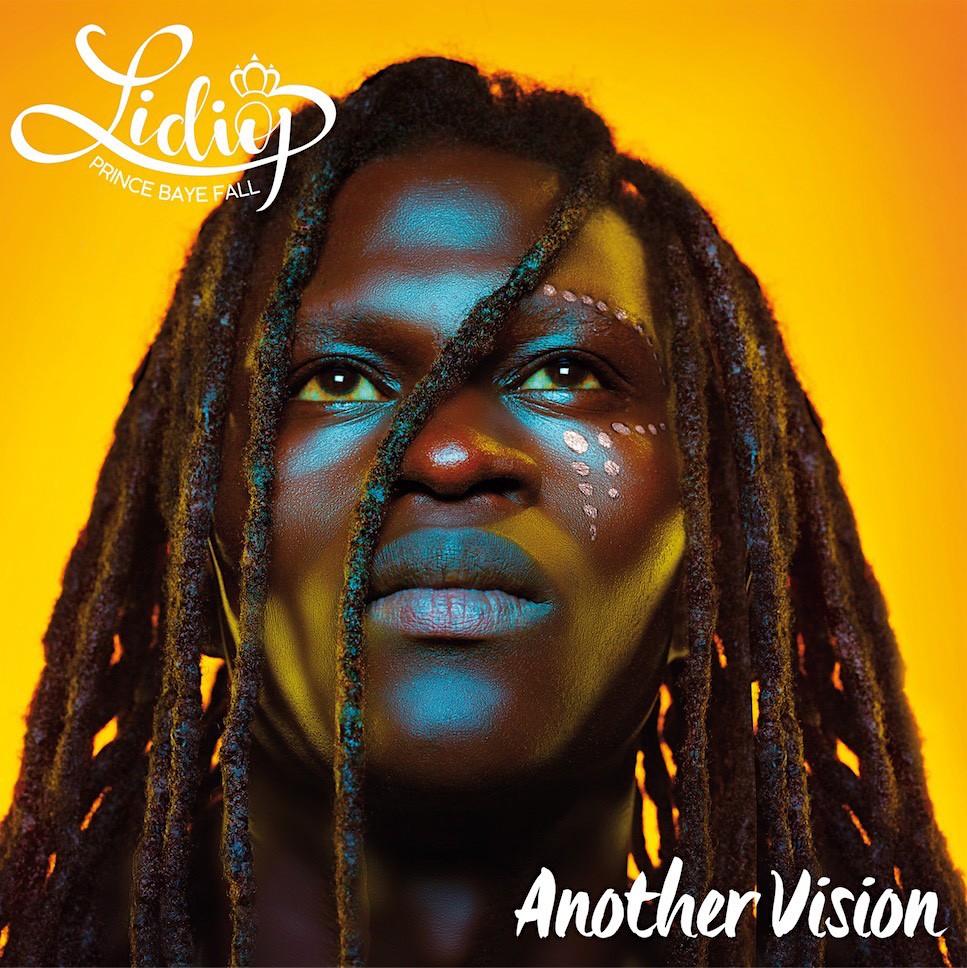
You sing in French and English and Wolof. Can you help us understand the content of your songs, like Mama Bless and Yaram Faal?
Mama Bless is just to say, "Mama bless me!" When you choose one road, and you have many obstacles on the road, like, when I came from Senegal to France, the blessings of Mama is something powerful. When your Mama bless you, any kind of problem you have you can handle it, so your Mama's blessing is a good thing. Another part is to tell Mama, "Thank you for everything you did for me, for the education, for what you teach me in this life, thank you for the gratitude of God, I'm on the right way." I say in the song what she told me when I was young, "Boy, never go the wrong direction, go forward, even when the things are hard, you can handle it, even when it's far, you can walk the distance. Think about where you are from and who you are, and I will always stay here."
Yaram Faal is a spiritual song, I sing it for my spiritual guide. I am Baye Fall, and every Baye Fall has someone you pay allegiance to. The foundation of Baye Fall is the way of living simple and be humble, like you woke up wearing nothing, someone who gives his time and his money for other people. So this song talks about where the Baye Fall are coming from, what my spiritual guide represents for me, and I give thanks to him for the value they taught me, for taking me like a disciple of this way, because I found myself and I found the right way, and I say just thank you for that. 'Yaram' means the great, the wise.
What about KawSara?
KawSara is a Baye Fall place, it's like when the Rastafari say Mt. Zion. The Baye Fall, we got one village from our spiritual guide, it's called KawSara, the place of peace, the place where you are one with God. It's like the motherland of Baye Fall. Everywhere I walk, they call me Rastaman, and I say, "No, I'm not Rasta, I'm Baye Fall." And they ask, "What is that?" And I explain, this is the way of Bamba, the founder of the Muridiya way of life. Let me tell you about Sheikh Ibra Fall, he showed us the way how to be Baye Fall, the singing, the chanting… They chant the name of God from morning to evening, they make a circle and they sing "La illallah illallah". In Senegal, you will see some people who put the Baye Fall clothes and say they are Baye Fall, but they are not, that's why I make the song to tell them the true way of Baye Fall.
The last one which is mostly in Wolof is Mak Mo. What is it about?
It is talking about my brother who passed away. This song is… I think I can't sing it on stage, actually, because I will start to cry. When I was recording the album, this was the first time I go back to the studio since his death. He passed away, and he was not only my big brother, but my friend, he was my everything, someone who pushed me to go higher. "You are like a little bird," he told me, "take your time to open your wings and fly. Don't go quickly, take your time, everything is gonna come if you are patient and if you work hard." And in this song I tell the story, "One night while I was sleeping at 4 o'clock my phone rings and when I take the phone it was like the world was down because they told me you are gone." It's very sad, that was a very hard time, I couldn't sleep, but it was necessary for me to release this emotion and thank him, and I'm sure he is proud of me, cause sometimes I feel he's here with me. His name is Mamadou Diop, but everybody call him Mak Mo, the big brother.
Thank you for sharing. The song Lobi, is it a traditional story or did you make it up?
It's a real story that happened to me, it's about a girl I met a few years ago, and she decided to leave the city and go into the jungle. Lobi in the Guyana language it means 'baby, my sweetie', something like that.
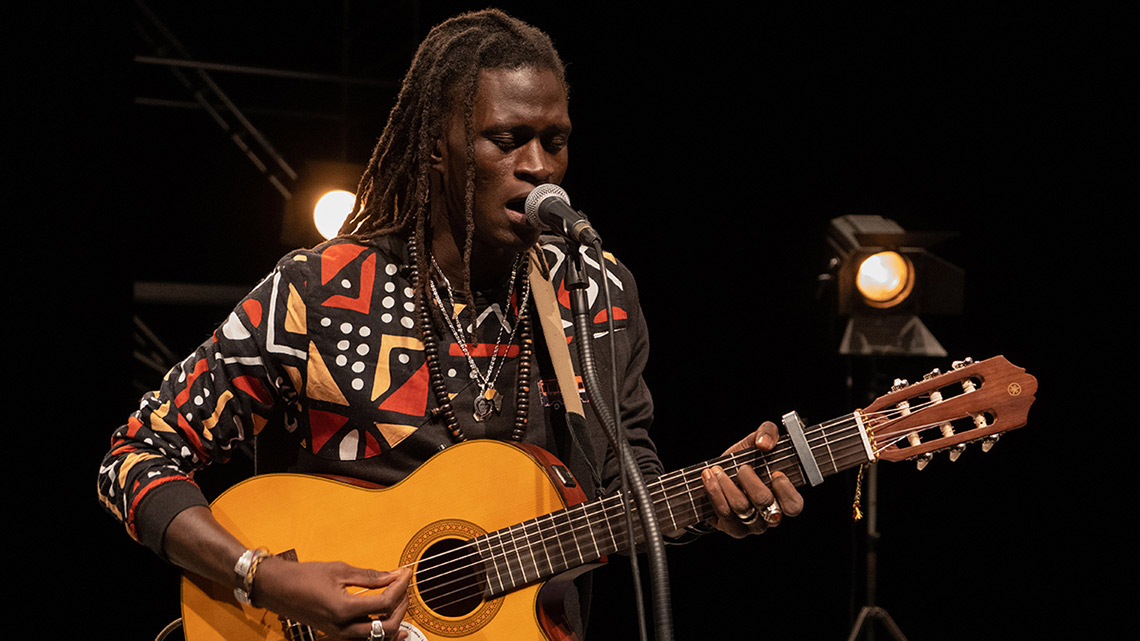
One of the songs, La Corrida, is a cover by Faencis Cabrel. Why did you include this on the album?
I chose it because when I was young, my father was listening to a lot of French music, and that song especially had an impact on me. I always imagined how the bulls feel, because they talk about La Corrida, the bull chase in Spain, you know. I was thinking about how the bull suffers, and it touched me, and I used it as a parallel for this life right now. I see people like the bull, all the things people are dependent on, internet and money, they run a race and forget themselves, so every day we don't live, we just try to survive, so we are like the bull. And I put the Wolof song inside, too.
When you wrote the song Senegal, did you already have the vision in mind for the video?
Not fully, but some, yes. The image of the beach with the boats I had it in my mind when I sang the chorus, but all the other things came after. The song came to me when I was at a show in Nice in the South of France, I was making an acoustic concert, and before the break, the melody was coming to my head, and I started to sing, (sings) "There is a land so far away, it's faced to the ocean…" I asked somebody who was in front of me, "Please can you record it? Because otherwise I will forget!" And he recorded it and sent it to me. It was normal for me to make a song called Senegal, because what Senegal gave to me… when you are there, you didn't know the richness of your language, of your culture, what your country gives you, but when you are outside, you realize, 'Wow, we got so many things!' You can even smell the difference between here and there, the food, the air and everything, and right now I miss my town every day.
Where did you shoot the video, and who accompanied you?
We went to many places, Saint Louis, Saly, Lompoul, we got around a lot. I even discovered a place for the video I never knew it was there! We shoot it in February this year, we went for just five days, I never did that before. The young man in the video is my drummer, Clément. He plays percussion on the album.
Are any other videos planned?
We already made Yaram Faal, I will make Better Days too, and now finally I think I will also make KawSara and maybe Mama Bless, depending on the money.
Right now you are very busy with the promotion, of course. Are there any shows planned during the next weeks?
I'll do a showcase in the subway on Friday, and maybe I will organize a release party for the acoustic album, I'm looking around for the right place for that right now. Also, I will open for Dub Inc in Strasbourg on October 7th and he next day in Fribourg in Switzerland. I also have a big show in December in Paris! So, I will promote this album, and then I want to make a big show in Senegal with Meta Dia and Natty Jean, and then as I said I plan to go to Jamaica to record my new album.
A lot of things are happening! This summer we met at the Summerjam, where else did you go?
I did a show at the Sun Ska Festival and many others. The Summerjam was really great, I liked the place and the energy and the shows, just sometimes you had to choose which show to watch because they were on at the same time. I did other festivals like No Logo, I really like it, I appreciate it. I toured a lot! It was a good experience, and good to come back out after the pandemic, to share the vibration with the people.
Speaking of… what is your message to the people, what do you want them to take from your music?
I think people take the emotion first of all, the words if they can understand. They feel the vibes deep down, because since the release on Friday I received a lot of message like, 'Wow, I listened to the album and I had to cry!', and for me… I don’t want to make people cry, but I think they feel the vibration, because I sing with my heart. That's why I say, the day I sing and I don't feel it in my heart I will stop it. For me it's important to give them the real part of me, this album is one part of me and I give it to them to let them discover who I am.
Thank you so much for giving us your music, for giving us your vision!
Another Vision is my new vision and it's my mission!




